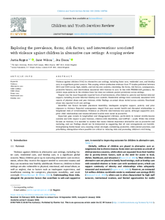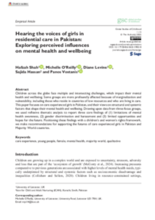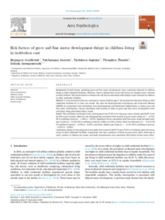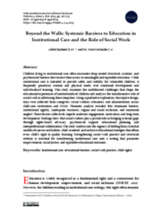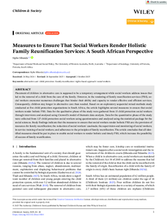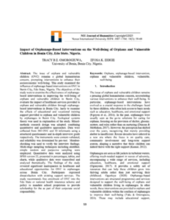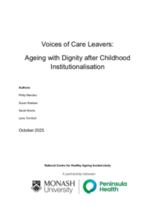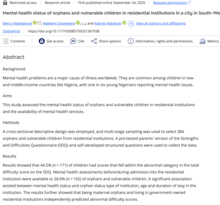Displaying 1 - 10 of 771
This scoping review synthesises evidence from 77 studies (2014–2024) on violence against children in foster, residential, and kinship care, finding neglect to be the most common form of maltreatment, alongside physical, emotional, sexual, and peer violence across settings. While evidence on effective interventions is limited, the review highlights key risk factors and consequences, underscores the protective role of supportive relationships and trauma-informed care, and calls for stronger family-based care, oversight, and child-centred practices to reduce harm and promote well-being.
This paper explores the mental health and wellbeing of care-experienced girls in Pakistan, highlighting how structural and systemic factors shape their experiences. Using focus group data, it identifies limited mental health awareness, gender discrimination and harassment, and restricted opportunities as key challenges, and offers recommendations framed within children’s and women’s rights to better support their futures.
This study identifies high rates of gross and fine motor delays among young children living in residential care facilities in Thailand and examines factors contributing to these developmental challenges. These findings highlight the developmental vulnerabilities of young children in residential care and point to key predictors that can inform early interventions.
This study examines the educational barriers faced by children in institutional care in India, identifying how structural rigidity, limited resources, stigma, and emotional neglect undermine equitable access to meaningful learning. Drawing on qualitative insights from care and education professionals, it highlights the critical role of social work in advancing child-centred, rights-based approaches to transform institutional care into an environment that supports inclusion, wellbeing, and educational equity.
This study explores the lived experiences of orphans and vulnerable children in South Africa’s rural Vhembe District and finds that they face significant challenges, including maltreatment, deprivation, neglect, abuse, and social alienation. The findings highlight an urgent need for strengthened psychosocial support through coordinated stakeholder action, reinforced drop-in centres, and enhanced prioritization by social workers.
This study examines how children in Swiss residential care perceive safety, revealing that while institutions aim to protect them, many still experience both safety and unsafety shaped by physical spaces, institutional rules, and relationships with staff. By centering children’s voices, the article highlights gaps between residential care’s protective mandate and children’s lived experiences, calling for a more nuanced, justice-oriented understanding of safety in child welfare.
This study examines challenges that hinder social workers in South Africa from providing effective family reunification services, resulting in children staying in alternative care longer than necessary. Findings from a mixed-methods study suggest that providing resources, reducing caseloads, supervising and training social workers, and adhering to reunification principles are key measures to ensure holistic and timely family reunification.
This study examined the impact of orphanage-based interventions on orphans and vulnerable children (OVC) in Benin City, Nigeria, focusing on healthcare, education, and vocational support. Findings revealed significant inadequacies in these services, with participants expressing dissatisfaction, and the study recommends free health insurance enrollment and mandatory school scholarships to improve OVC well-being.
This report explores how childhood institutional care negatively shapes health, well‑being, housing, and social outcomes well into older adulthood for people now aged 50 and above in Australia. It argues for a shift away from institutional aged care and towards trauma‑informed, person‑centered home or community care — designed with and for care leavers — to uphold dignity and improve long-term quality of life.
This study assessed the mental health of children in 12 Nigerian residential institutions and found that many had abnormal scores on the Strengths and Difficulties Questionnaire, with risks linked to orphan status, type of institution, and length of stay. The findings highlight the urgent need for routine mental health assessments and better care for children in residential settings.

